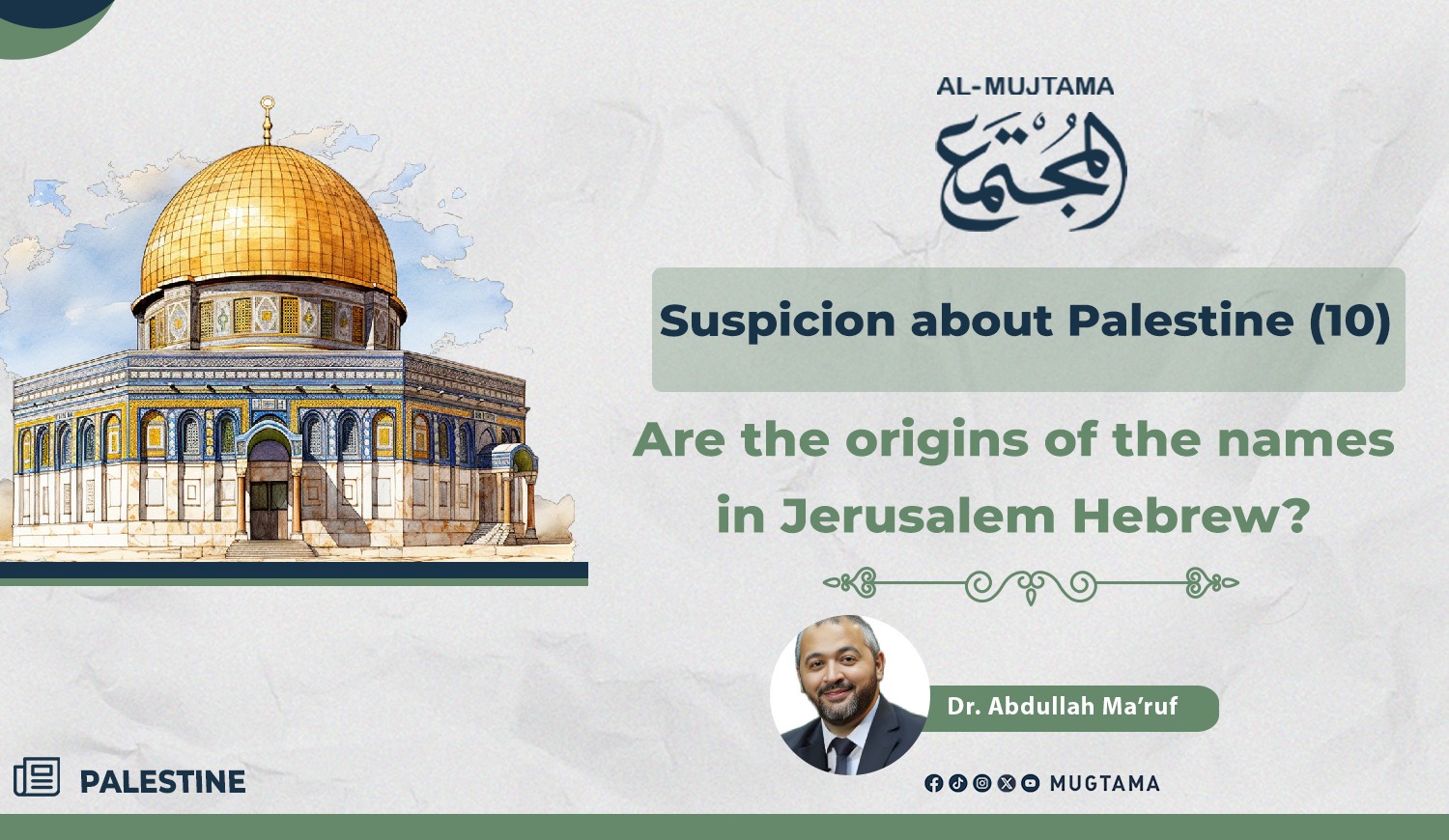Suspicion about Palestine (10)
Are the origins of the names in Jerusalem Hebrew?

A
considerable number of Orientalist studies claim that Jews had a significant
influence on the Quranic text and early Islamic teachings, and that Muslims
adopted the names of sacred places from Hebrew, which is considered the
official language of the Jews in "Israel" today!
This
narrative goes further to claim, for example, that Waraqah ibn Nawfal, who
played a role in explaining the concept of revelation to the Prophet Muhammad
(peace be upon him) in the early days of the Quran's descent, was nothing but a
Jewish scribe. It relied on a narration from Lady Aisha (may Allah be pleased
with her) in Sahih Bukhari, in which Aisha states: "He used to write in
Hebrew." However, this narrative has taken this part of the text out of
context, as the full text states: "He was a man who had converted to
Christianity during the days of ignorance, and he wrote the Hebrew Bible,
writing in Hebrew whatever Allah wished him to write from the Gospel.
It is
clear here that reading this text clearly reveals the intention of distortion
by some promoters of the "Israeli" narrative. The paper was written
by a Christian, and while mentioning Hebrew here, it is, in fact, evidence that
Hebrew is not a Jewish language as the "Israeli" media portrays today,
but rather a dialect of the ancient Canaanite Arabic dialects known in the
Levant, such as Aramaic and others.
It is
noteworthy that many of the studies published by the proponents of this school
primarily rely on the documents of the " Cairo Genizah " discovered in Egypt, which date back to
the period between the 11th and 13th centuries AD; that is, to the time of the
Crusades.
This
is because these documents were written in Hebrew letters - although they are
read in Arabic - which led the figures of the 'Israeli' academic school to
claim that the origin of the terms and Islamic texts related to Jerusalem is
the Jewish religion by citing the language. Some, like Shlomo Dov Goitein,
argue that the term Bayt al-Maqdis,' which refers in the honorable
hadith to Al-Aqsa Mosque, is merely a distortion of the Hebrew phrase Bēṯ hamMīqdāš.' According to this understanding, it indicates that the idea of the
sacredness of the place originates from Judaism, since Muslims, according to
this claim, borrowed from Hebrew even the name of the place and altered it to Bayt
al-Maqdis.
In
fact, this statement contains many fallacies. As we explained earlier when
discussing Waraqah ibn Nawfal, what is referred to as "Hebrew" at
that time was not a different language, as some linguists from the Orientalist
school attempt to claim, but rather a dialect of the ancient Arabic dialects
that dates back to the early Arab Canaanites.
The
term " Bayt al-Maqdis " (the Holy House), therefore, does not
refer in any way to a Hebrew language; because Hebrew is not an independent
language, but rather an alphabetic script that uses ancient Arabic words that
still exist. Even the documents of the "Cairo Geniza" confirm this
trend, as most of them are written in Hebrew script, but in eloquent Arabic.
Anyone who knows the Hebrew letters - which evolved from the Canaanite Arabic
known as Phoenician - can read the texts of these documents with great ease.
A
simple comparison of the vocabulary of the language now called
"Hebrew" in the inscriptions on tombstones and the large monuments in
the region of Al-Hijr (Madain Salih), which were carved by the ancient Arabs in
this area and the Nabateans as well, illustrates this fact; many of the terms
used in Hebrew are the same as those used by the ancient Nabateans and
Canaanites.
This
indicates that the Canaanite Arabic, which formed the common ground of what we
now know as Aramaic, Arabic, and Hebrew, was the linguistic origin of all these
dialects that, according to the understanding of the followers of the
Orientalist school, transformed into separate languages. Especially since the
Qurashi and Sham Arabic differ significantly from the Himyari and Yemeni
dialects, which some claim to be the origin of the Arabic known in the era of
the Prophet Muhammad (peace be upon him) and even in our time. This is what Abu
Amr Ibn Al-Ala stated when he said: "The language of Himyar and the
farthest regions of Yemen is not our tongue, nor is their Arabic our Arabic.
Read
also: Could Zionist Control Shift Prayer Dynamics at
Al-Aqsa?
The
term " Bayt al-Maqdis " and even " Bēṯ hamMīqdāš," which are used by Jews today, are pure Arabic words of Canaanite
origin, with no connection to modern Hebrew. In fact, when Hebrew became an
independent language, it borrowed these expressions from Arabic, which is
considered the root from which all dialects in this region originate.
Read
also: The stages of the Zionist occupation of Jerusalem











